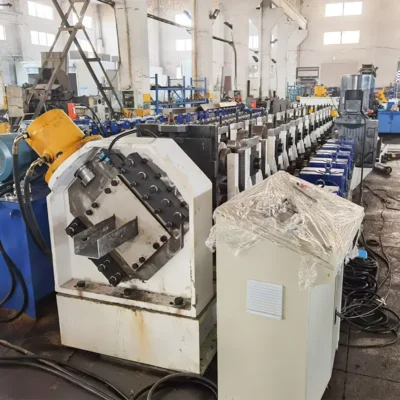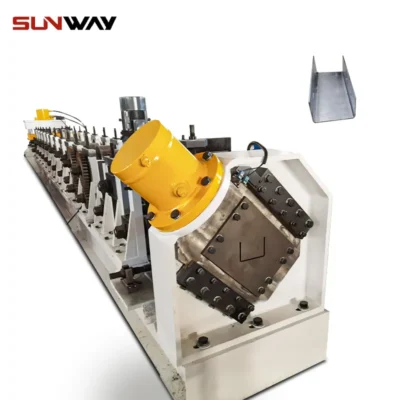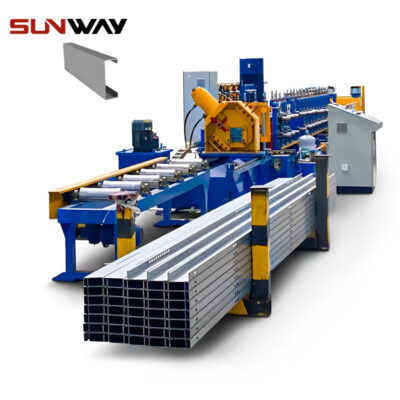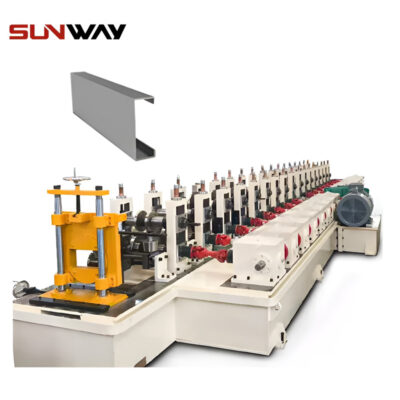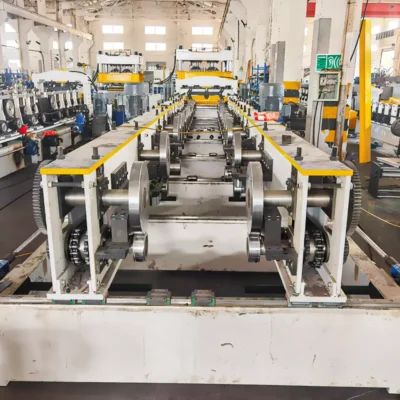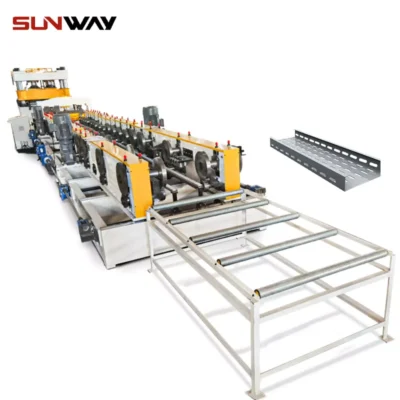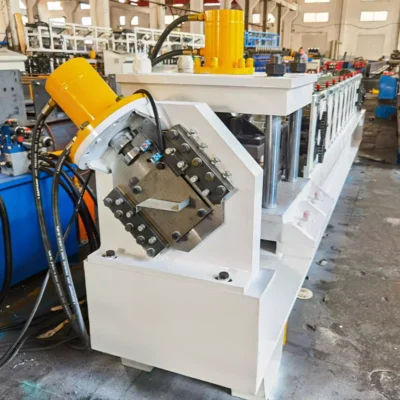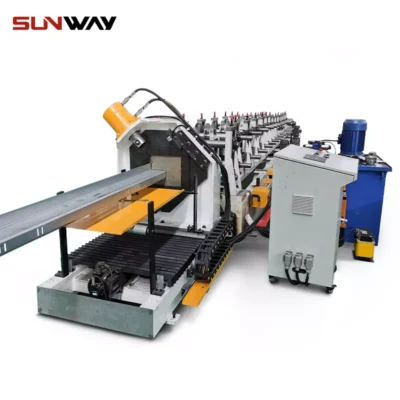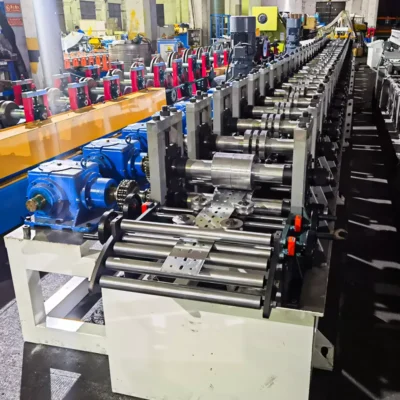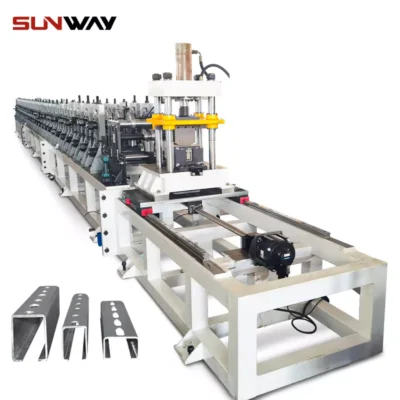In the fast-paced world of manufacturing, logistics, and warehousing, conveyor systems are the lifeline that keeps operations running smoothly. At the core of these systems lies the conveyor frame, a structural component that ensures durability, precision, and stability. To meet the growing demand for high-quality conveyor systems, Conveyor Frame Roll Forming Machines have become indispensable in modern production facilities.
This guide dives deep into the Conveyor Frame Roll Forming Machine, its applications across industries, technical innovations, pricing, and why Wuxi Sunway Machinery is a leading player in this domain. Whether you’re a conveyor system manufacturer or looking to streamline your material handling process, this article has you covered.
What is a Conveyor Frame Roll Forming Machine?
A Conveyor Frame Roll Forming Machine is specialized industrial equipment designed to produce the structural frames used in conveyor systems. These machines process metal coils through a series of rollers, gradually shaping them into precise profiles that form the backbone of conveyor systems.
From light-duty conveyors used in warehouses to heavy-duty systems in mining and automotive industries, roll-formed conveyor frames offer unmatched consistency, strength, and durability. By automating the production process, these machines reduce material waste, lower costs, and ensure uniformity in every frame produced.
Applications of Conveyor Frame Roll Forming Machines
Conveyor frames are essential in various industries, as they support the belts, rollers, and other components that move goods efficiently. Here are the primary applications of frames produced by roll-forming machines:
1. Warehousing and Distribution Centers
- Use Case: Conveyor systems streamline the movement of goods in e-commerce distribution hubs and large warehouses.
- Why It Matters: Roll-formed frames ensure lightweight yet sturdy structures, reducing wear and tear over time.
2. Manufacturing and Assembly Lines
- Use Case: Conveyor systems are integral to automotive, electronics, and machinery manufacturing lines.
- Why It Matters: High-precision frames provide the stability needed for smooth assembly and production processes.
3. Food and Beverage Processing
- Use Case: Conveyor systems transport raw materials and finished goods in food processing plants.
- Why It Matters: Corrosion-resistant roll-formed frames ensure hygiene and durability, even in wet or humid conditions.
4. Mining and Bulk Material Handling
- Use Case: Heavy-duty conveyor systems move minerals, ores, and other bulk materials in mining operations.
- Why It Matters: Roll-formed frames offer the strength to handle heavy loads and harsh environments.
5. Airport Baggage Handling
- Use Case: Conveyor systems transport baggage efficiently in airports worldwide.
- Why It Matters: Roll-formed frames provide the precision and durability needed for long-term reliability in high-traffic areas.
6. Packaging and Logistics
- Use Case: Conveyor systems are used for sorting, packaging, and transporting goods in logistics facilities.
- Why It Matters: Lightweight yet robust frames ensure efficiency in moving items of varying weights and sizes.
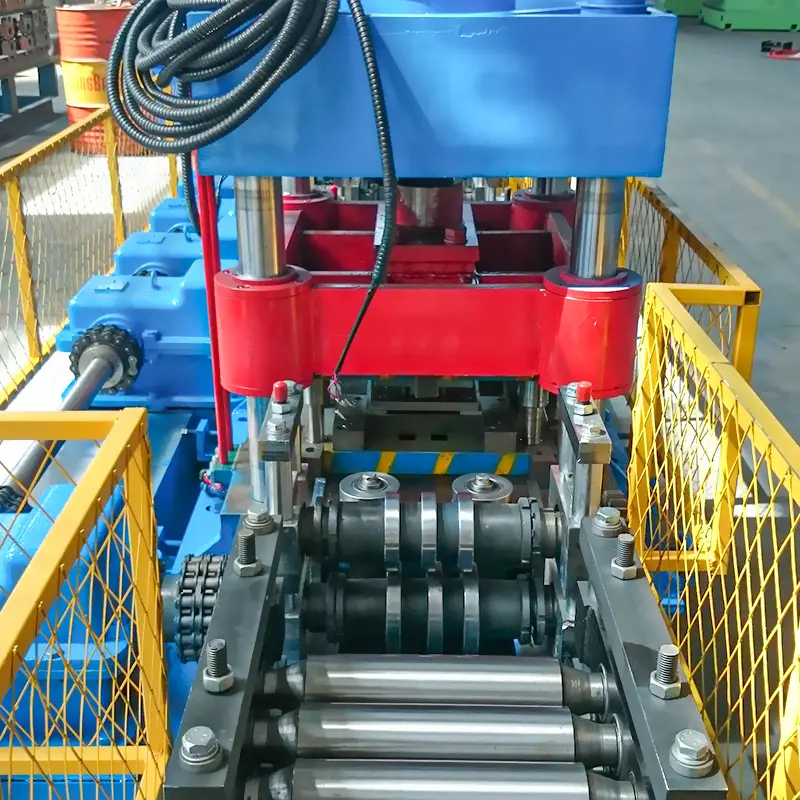
Key Features of Wuxi Sunway Conveyor Frame Roll Forming Machines
When it comes to manufacturing conveyor frames, Wuxi Sunway Machinery offers advanced roll-forming machines designed for precision, efficiency, and customization. Here’s why their machines are trusted globally:
1. Multi-Profile Capabilities
- What It Offers: Machines can produce a variety of profiles, including U-channels, C-sections, and rectangular frames.
- Why It’s Revolutionary: Supports diverse conveyor applications, from lightweight systems to heavy-duty industrial conveyors.
2. High-Strength Material Processing
- Supported Materials:
- Galvanized steel
- Stainless steel
- Aluminum alloys
- Why It Matters: Ensures the production of frames that are durable, corrosion-resistant, and capable of handling high loads.
3. Precision Engineering
- What It Does: Produces frames with tight tolerances and smooth finishes.
- Why It’s Important: Guarantees uniformity and easy assembly, reducing alignment issues during installation.
4. Integrated Punching and Cutting Systems
- Features: Servo-controlled punching and cutting units create holes, slots, or custom features with high precision.
- Why It Matters: Eliminates the need for secondary operations, saving time and costs.
5. High-Speed Production
- Performance: Capable of producing up to 15 meters of conveyor frame profiles per minute, depending on the design.
- Why It Matters: Meets the high-volume demands of conveyor system manufacturers.
6. PLC-Controlled Automation
- Features:
- Fully programmable logic controllers (PLC) with an intuitive touchscreen interface.
- Real-time monitoring for error detection and diagnostics.
- Stores multiple frame designs for quick setup.
- Why It’s Revolutionary: Simplifies operation and ensures consistent quality across production runs.
7. Modular and Space-Saving Design
- What It Includes: Compact machines designed to integrate seamlessly into existing production lines.
- Why It Matters: Optimizes factory floor space while providing flexibility for future upgrades.
8. Eco-Friendly Features
- What It Offers: Energy-efficient motors and waste-reducing technologies.
- Why It Matters: Reduces operational costs while supporting sustainable manufacturing practices.
Production Workflow of a Conveyor Frame Roll Forming Machine
The production process for conveyor frames is streamlined for maximum efficiency and precision. Here’s how it works:
1. Decoiling
- Raw metal coils are loaded onto the decoiler, which feeds the material into the machine.
2. Leveling
- A leveling system ensures the material is flat and free from warping before entering the roll-forming section.
3. Roll Forming
- The material passes through a series of rollers that gradually shape it into the desired frame profile.
4. Punching and Cutting
- Integrated punching units create holes and slots, while cutting systems trim the frames to the required lengths.
5. Surface Treatment
- Optional galvanization or powder coating enhances corrosion resistance and aesthetics for specific applications.
6. Stacking
- Finished frames are automatically stacked for easy packaging and transportation.
Pricing of Conveyor Frame Roll Forming Machines
The price of a Conveyor Frame Roll Forming Machine is determined by its features, production capacity, and customization options. Below is a general pricing guide for 2025:
| Machine Type | Capabilities | Price Range (USD) |
|---|---|---|
| Standard Machines | Basic frame production with high efficiency | $150,000–$250,000 |
| High-Precision Machines | Advanced tolerances and multi-profile output | $250,000–$400,000 |
| Fully Customizable Machines | Multi-material compatibility and features | $400,000–$600,000 |
For tailored pricing and financing options, contact Wuxi Sunway Machinery.
Advantages of Using Conveyor Frame Roll Forming Machines
Investing in a Conveyor Frame Roll Forming Machine offers numerous benefits for manufacturers:
1. Enhanced Efficiency
- High-speed production reduces lead times and increases output.
2. Precision and Consistency
- Ensures uniform quality across all frames, minimizing defects and assembly issues.
3. Material Versatility
- Supports a wide range of materials, including corrosion-resistant alloys.
4. Cost Savings
- Reduces material waste and labor costs, improving overall profitability.
5. Scalability
- High production capacity allows manufacturers to meet growing demands for conveyor systems.
FAQs About Conveyor Frame Roll Forming Machines
| Question | Answer |
|---|---|
| What is the machine’s production capacity? | Machines can produce up to 15 meters of frame profiles per minute, depending on the design. |
| Can the machine handle stainless steel? | Yes, it is designed to process durable and corrosion-resistant materials. |
| What is the typical lead time for delivery? | Delivery takes 3–6 months, depending on customization requirements. |
| Does Sunway provide training? | Yes, comprehensive operator training is included with every machine purchase. |
| What is the expected lifespan of the machine? | With proper maintenance, the machine can last 10–15 years or more. |
| Can the machine produce custom profiles? | Absolutely! The machine supports a wide range of custom profiles for various conveyor systems. |
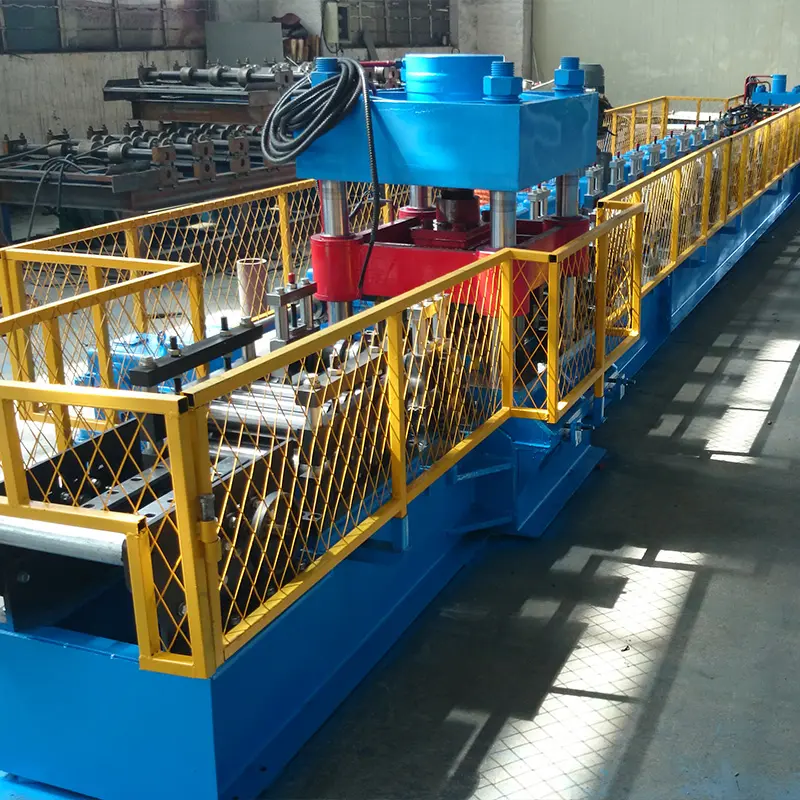
Global Trends Driving the Demand for Conveyor Frame Roll Forming Machines
The rapid evolution of industrial automation and material handling systems is fueling the demand for Conveyor Frame Roll Forming Machines in 2025. Here are the key trends shaping this industry:
1. Surge in E-Commerce and Warehousing Automation
- The Trend: The global e-commerce market is expected to exceed $7 trillion by 2025, driving the expansion of warehousing and distribution centers.
- Impact on Conveyor Systems: Automated conveyor systems are essential for sorting, packaging, and transporting goods within warehouses.
- Why It Matters: Roll-formed conveyor frames provide the precision and reliability needed to optimize automated workflows.
2. Growth of Smart Factories
- The Push: Smart factories, driven by Industry 4.0 principles, are integrating advanced conveyor systems for seamless material handling.
- Impact on Frame Design: Conveyor frames must be compatible with IoT-enabled sensors and robotic systems.
- Why It’s Exciting: Roll-forming machines allow manufacturers to produce customized frames tailored to smart factory requirements.
3. Expansion of the Food & Beverage Industry
- The Numbers: The global food and beverage processing market is projected to grow at a CAGR of 6.5% through 2030.
- Impact on Conveyor Systems: Hygienic, corrosion-resistant conveyor frames are essential for transporting food products safely.
- Why It Matters: Roll-forming machines can process stainless steel and other materials suitable for food-grade applications.
4. Rising Adoption of Heavy-Duty Conveyors
- The Context: Industries like mining, automotive, and construction are deploying heavy-duty conveyors to transport large volumes of materials.
- Impact on Frame Manufacturing: Frames must be strong enough to handle high loads and harsh environments.
- Why It’s Relevant: Roll-forming machines produce high-strength frames that meet the demands of heavy-duty applications.
5. Sustainability Goals in Material Handling
- The Push: Companies are prioritizing eco-friendly practices and materials in their supply chains.
- Impact on Conveyor Production: Manufacturers are seeking energy-efficient machines and recyclable materials for conveyor frames.
- Why It’s Important: Roll-forming machines optimize material usage and enable the production of recyclable frames, aligning with sustainability goals.
Technological Innovations in Conveyor Frame Roll Forming Machines
The advancements in Conveyor Frame Roll Forming Machines are transforming how conveyor systems are manufactured. Here are the most significant innovations:
1. IoT-Integrated Machines
- What It Does: IoT sensors collect real-time data on machine performance, material usage, and output quality.
- Benefits:
- Enables predictive maintenance to avoid costly downtime.
- Provides actionable insights for process optimization.
- Allows remote monitoring and control of production lines.
2. Servo-Driven Precision
- The Technology: High-speed servo motors control the rollers and cutting units with extreme accuracy.
- Why It’s Important:
- Ensures consistent dimensions and smooth finishes for conveyor frames.
- Reduces material waste by optimizing the roll-forming process.
- Increases production speed without compromising quality.
3. Advanced Welding Capabilities
- The Feature: Integrated welding systems create seamless joints for hollow conveyor frame profiles.
- Why It Matters:
- Enhances the durability and load-bearing capacity of frames.
- Reduces weak points in the structure for long-term reliability.
- Eliminates the need for post-production welding, saving time and costs.
4. Multi-Profile Production
- What It Offers: Machines can produce a variety of conveyor frame profiles, from lightweight U-channels to heavy-duty rectangular frames.
- Why It’s Revolutionary:
- Supports diverse conveyor applications across industries.
- Simplifies the transition between different frame designs.
- Reduces the need for multiple machines.
5. AI-Powered Quality Control
- What It Does: Artificial intelligence analyzes production data to detect defects and ensure consistent quality.
- Why It’s Revolutionary:
- Reduces scrap rates by identifying issues early in the process.
- Ensures compliance with stringent quality standards for conveyor systems.
- Improves customer satisfaction through defect-free outputs.
6. Energy-Efficient Operation
- The Innovation: Modern machines are equipped with energy-saving motors and systems.
- Why It Matters:
- Lowers electricity consumption, reducing operational costs.
- Aligns with industry sustainability goals.
- Supports green manufacturing practices.
Environmental Impact of Conveyor Frame Roll Forming Machines
Sustainability is a priority for industries worldwide, and Conveyor Frame Roll Forming Machines are paving the way for eco-friendly manufacturing. Here’s how they contribute:
1. Minimal Material Waste
- How It Works: The roll-forming process optimizes material usage, minimizing scrap and offcuts.
- Impact: Conserves raw materials and reduces production costs.
2. Recyclable Outputs
- The Advantage: Conveyor frames made from galvanized steel or aluminum can be fully recycled, supporting a circular economy.
- Why It’s Important: Reduces landfill waste and promotes sustainable material handling practices.
3. Energy Efficiency
- The Technology: Machines are equipped with energy-efficient motors and systems that consume less electricity.
- Why It Matters: Helps manufacturers reduce their carbon footprint and operational costs.
4. Localized Production
- What It Enables: Machines allow manufacturers to produce conveyor frames locally, reducing the environmental impact of transportation.
- Outcome: Supports regional sustainability while lowering logistics costs.
Comparison: Conveyor Frame Roll Forming Machines vs. Traditional Methods
Let’s compare roll-forming machines with traditional manufacturing methods like manual welding or stamping:
| Feature | Roll Forming Machine | Traditional Methods |
|---|---|---|
| Precision | High; ensures consistent dimensions | Moderate; prone to human error |
| Production Speed | High; up to 15 meters per minute | Slow; labor-intensive processes |
| Automation | Fully automated with IoT integration | Mostly manual or semi-automated |
| Material Waste | Minimal; optimized processes reduce scrap | Higher; less efficient material usage |
| Cost Efficiency | Higher initial cost, lower operational costs | Lower initial cost, higher long-term costs |
| Scalability | Ideal for high-volume production | Limited scalability for large-scale demand |
Additional FAQs About Conveyor Frame Roll Forming Machines
| Question | Answer |
|---|---|
| Can the machine handle heavy-duty materials? | Yes, it supports materials like galvanized steel and high-strength alloys. |
| What is the typical lead time for delivery? | Delivery takes 3–6 months, depending on customization requirements. |
| Does Sunway provide after-sales support? | Absolutely! Wuxi Sunway offers training, maintenance, and troubleshooting services. |
| What is the expected lifespan of the machine? | With proper maintenance, the machine can last 10–15 years or more. |
| Can the machine produce custom frame designs? | Yes, it supports multi-profile capabilities for customized designs. |
| Is operator training included? | Yes, comprehensive training is provided with every machine purchase. |
Why Choose Wuxi Sunway Machinery for Conveyor Frame Roll Forming Machines?
Here’s why Wuxi Sunway Machinery is the trusted partner for conveyor system manufacturers worldwide:
- Decades of Expertise: Proven track record in delivering innovative roll-forming machines for diverse industries.
- Global Reach: Customers in Asia, Europe, the Americas, and more trust Sunway’s technology.
- Customization Excellence: Machines tailored to meet specific conveyor frame designs and material requirements.
- Sustainability Commitment: Eco-friendly designs that minimize waste and energy usage.
- Advanced Technology: Features like IoT integration, servo-driven systems, and AI-powered quality control.
- Comprehensive Support: From installation to troubleshooting, Sunway ensures seamless operations and customer satisfaction.
Conclusion: Transforming Material Handling with Roll Forming Technology
The Conveyor Frame Roll Forming Machine is reshaping the material handling industry by enabling the efficient production of durable, precise, and customizable conveyor frames. Whether you’re upgrading a distribution center, manufacturing facility, or logistics hub, these machines provide the scalability and efficiency you need to stay ahead in 2025.
Ready to take your conveyor production to the next level? Contact Wuxi Sunway Machinery today to explore their state-of-the-art roll-forming solutions. Together, let’s revolutionize material handling—one frame at a time!

